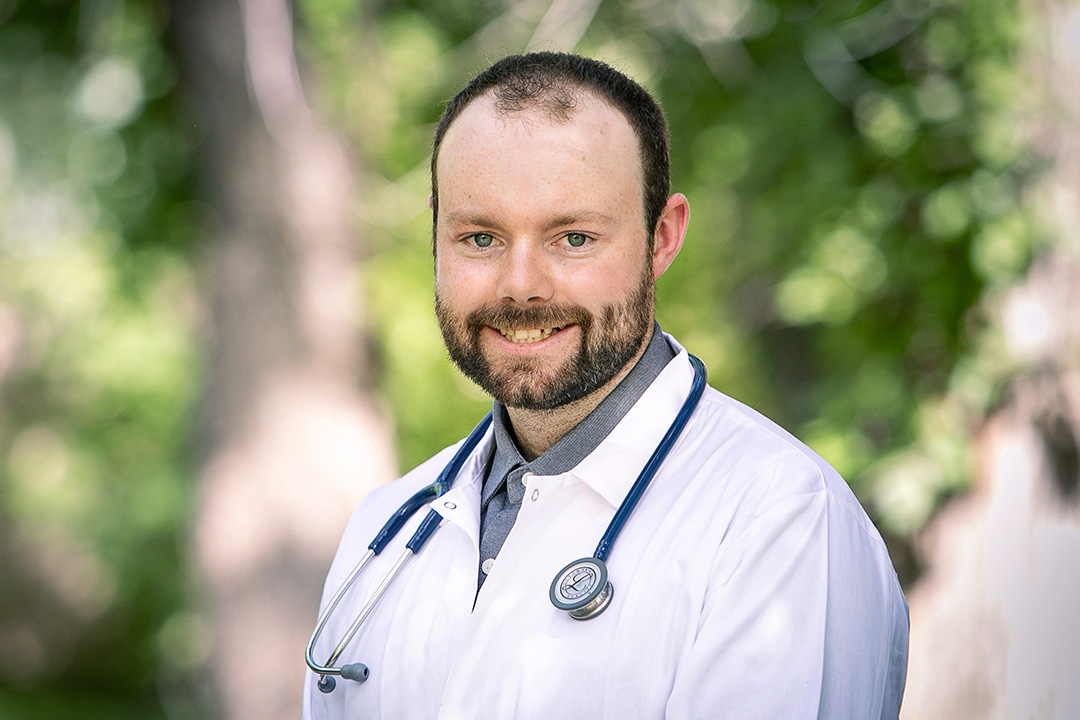
B.C. student’s veterinary career choice flowed from salmon farming experience
When Matthew Wilson’s father took him kayaking along the coast of British Columbia, that holiday adventure ignited a new interest in his life — a fascination with the ocean and its unique ecology and biology.
By Lynne GunvilleEager to learn more about the ocean, Wilson left his family’s home in the Canadian Rockies and enrolled at the University of Victoria after high school, where he completed a Bachelor of Science degree with a major in marine biology and a minor in ocean science.
Soon after graduation, Wilson became the fish health co-ordinator at Grieg Seafood BC Ltd., one of the world’s leading salmon farming companies that’s based at Campbell River, B.C.
“Working in animal health for salmon farming where our population numbers are very high [means] there is a lot of opportunity to see unique cases,” says Wilson, who lived in Courtenay, B.C. “A lot of the work I did also revolved around identifying the cause of mortality of an individual using clinical signs, tissue samples and bacterial cultures.”
To learn more about the challenges and external perceptions facing the salmon farming industry, Wilson joined the Young Salmon Farmers of B.C., a group of men and women under 35 years of age who are invested in supporting and promoting positive discourse about the B.C. salmon farming industry. Wilson valued his involvement in the group which was committed to counteracting misinformation and accurately representing the industry in the public eye.
As the supporting biologist for his company’s veterinarians, Wilson became involved with several studies aimed at understanding the etiology and treatment solutions for tenacibaculosis (yellow mouth) infections. Yellow mouth syndrome is the largest predictable cause of mortality in Atlantic salmon raised on the coast of B.C., and expensive antibiotic treatments are currently the only solution.
Since eradicating this deadly infection would greatly benefit the welfare of B.C. fish, Wilson and his company’s veterinary team focused on investigating solutions such as vaccines or alternative treatment options for yellow mouth infections.
Wilson credits microbiologist Tim Hewison for sparking his fascination with the workings behind animal health, and his interest continued to grow as he worked with veterinarians Drs. Patrick Whittaker and Kathryn Smith to complete tasks such as necropsies and bacterial cultures and identification.
As he and the veterinarians initiated and worked together on several research projects, Wilson grew more enthusiastic about animal health as a career.
“For me, it was the sum of experiences and learning how animal health is assessed and addressed that drove my desire to pursue veterinary medicine,” says Wilson. “Over time I came to the realization that becoming a veterinarian would fulfil a lot of these interests and give me the ability to continue to work in animal health — but with a stronger education to support it.”
Wilson began first-year classes at the Western College of Veterinary Medicine (WCVM) in mid-August, and so far he’s enjoying the practical, participatory classes such as anatomy. He’s grateful to his family and friends as well as his partner Avery for supporting his decision to return to school and helping him to make the move to Saskatchewan.
Although Wilson isn’t ready to make any decisions about his future, he really enjoyed his time in aquaculture, and he recognizes its potential as a sustainable way to provide large amounts of protein.
“With my experience in salmon farming, I’m also eager to learn more about other production animal systems, their challenges and similarities to aquaculture and how strategies from one system may be applied to another,” says Wilson.
Together we will support and inspire students to succeed. We invite you to join by supporting current and future students' needs at USask.
